Global Perspectives 1: Colonization's Effect on Indigenous Health
VerifiedAdded on 2022/11/17
|7
|1511
|475
Essay
AI Summary
This essay examines the profound and lasting impact of colonization on the health of Aboriginal and Torres Strait Islander peoples in Australia. It highlights the historical trauma inflicted through policies and practices, including residential schools, that aimed to suppress Indigenous culture and identity. The essay details how these actions have led to significant health disparities, including mental health disorders, substance abuse, and intergenerational trauma. It explores the psychological impacts of colonization, such as the violation of safety and self-esteem, and the resulting emotional pain. The paper also discusses the biological effects of trauma, particularly on brain development in children, and how these experiences contribute to poor health outcomes. The essay concludes by emphasizing the ongoing challenges faced by Indigenous communities and the widening health gap with non-Indigenous Australians, attributing these issues to the legacy of colonial injustices and the need for continued efforts to address these issues. The essay references several academic sources to support its claims and provides a comprehensive overview of the topic.
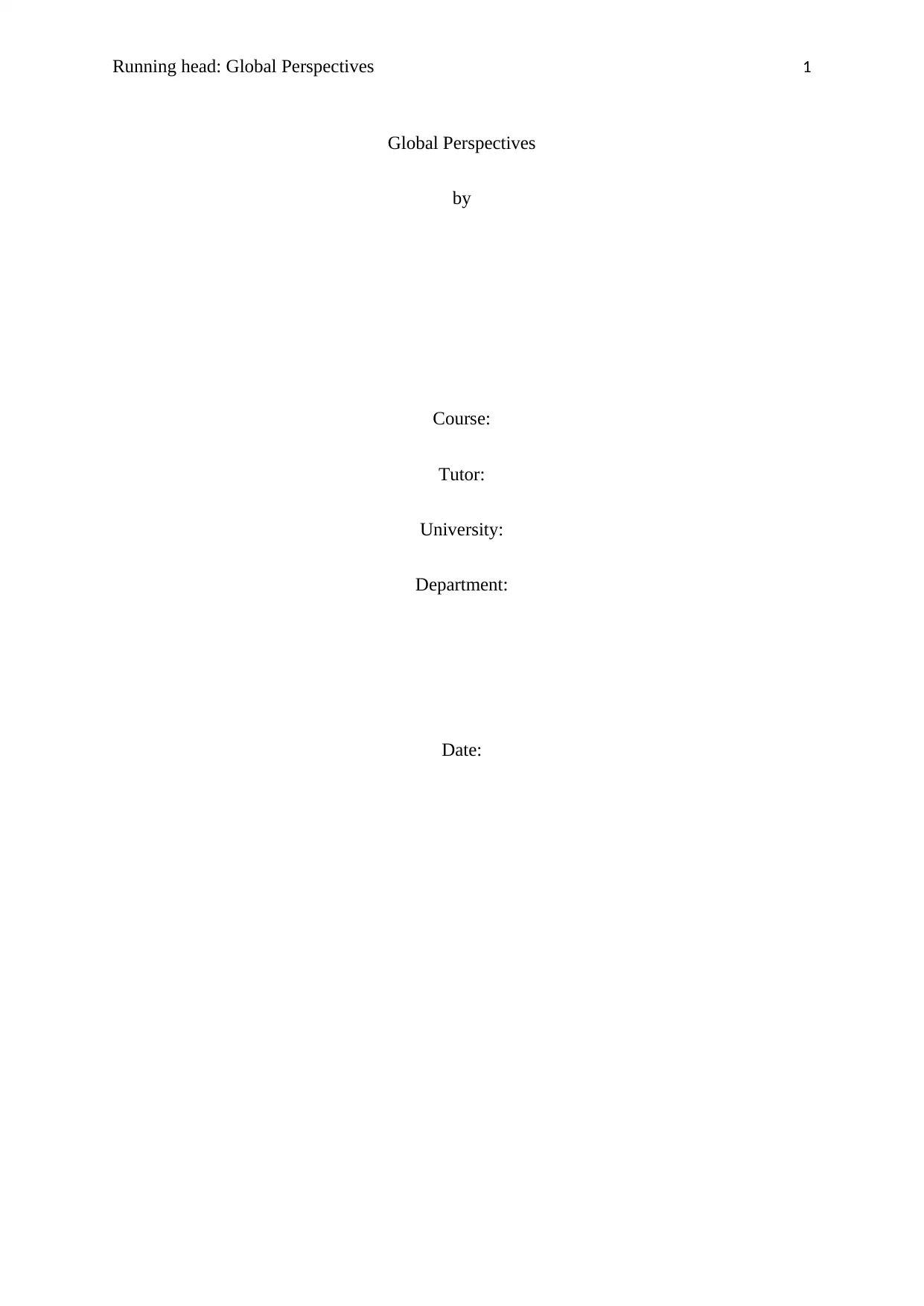
Running head: Global Perspectives 1
Global Perspectives
by
Course:
Tutor:
University:
Department:
Date:
Global Perspectives
by
Course:
Tutor:
University:
Department:
Date:
Paraphrase This Document
Need a fresh take? Get an instant paraphrase of this document with our AI Paraphraser
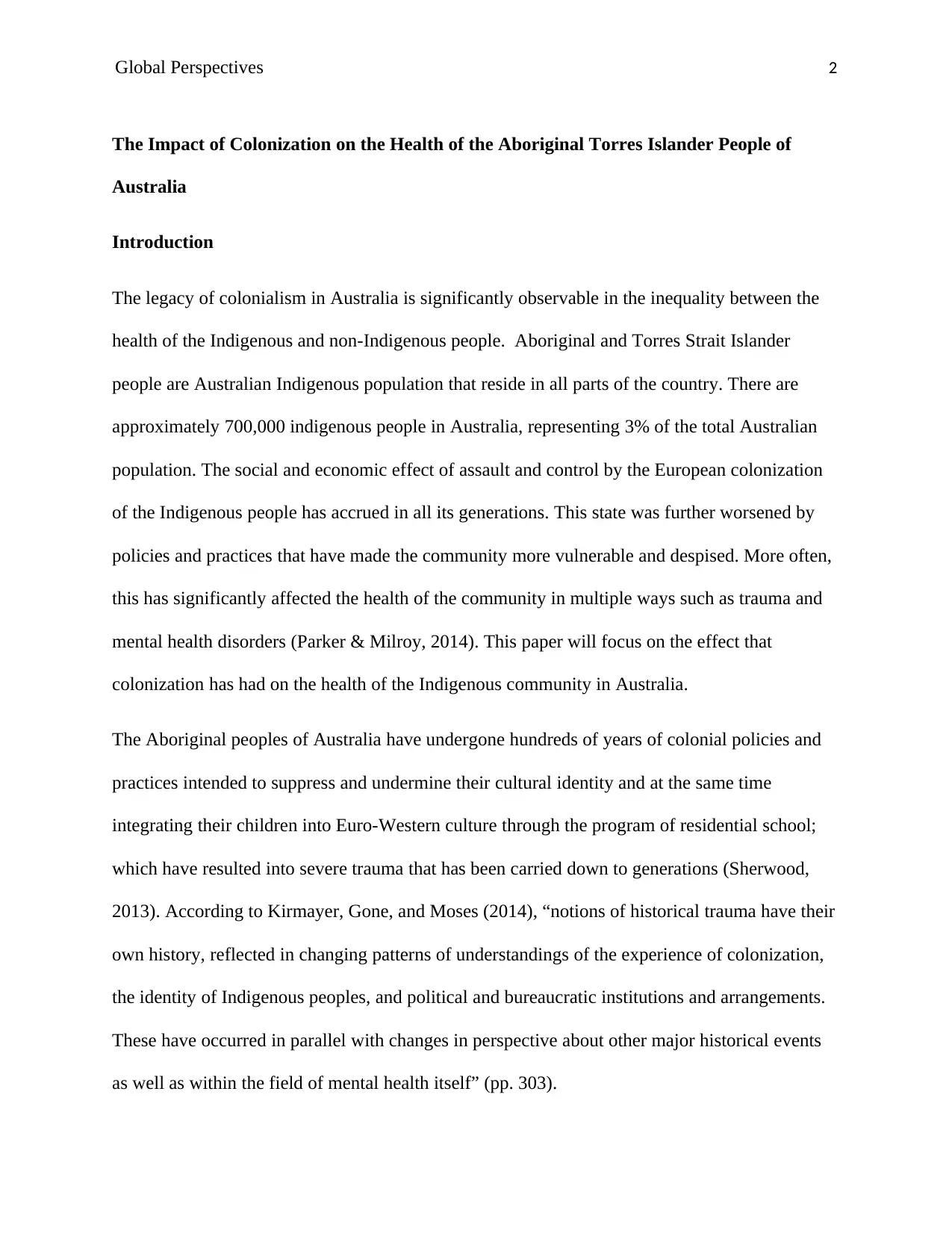
Global Perspectives 2
The Impact of Colonization on the Health of the Aboriginal Torres Islander People of
Australia
Introduction
The legacy of colonialism in Australia is significantly observable in the inequality between the
health of the Indigenous and non-Indigenous people. Aboriginal and Torres Strait Islander
people are Australian Indigenous population that reside in all parts of the country. There are
approximately 700,000 indigenous people in Australia, representing 3% of the total Australian
population. The social and economic effect of assault and control by the European colonization
of the Indigenous people has accrued in all its generations. This state was further worsened by
policies and practices that have made the community more vulnerable and despised. More often,
this has significantly affected the health of the community in multiple ways such as trauma and
mental health disorders (Parker & Milroy, 2014). This paper will focus on the effect that
colonization has had on the health of the Indigenous community in Australia.
The Aboriginal peoples of Australia have undergone hundreds of years of colonial policies and
practices intended to suppress and undermine their cultural identity and at the same time
integrating their children into Euro-Western culture through the program of residential school;
which have resulted into severe trauma that has been carried down to generations (Sherwood,
2013). According to Kirmayer, Gone, and Moses (2014), “notions of historical trauma have their
own history, reflected in changing patterns of understandings of the experience of colonization,
the identity of Indigenous peoples, and political and bureaucratic institutions and arrangements.
These have occurred in parallel with changes in perspective about other major historical events
as well as within the field of mental health itself” (pp. 303).
The Impact of Colonization on the Health of the Aboriginal Torres Islander People of
Australia
Introduction
The legacy of colonialism in Australia is significantly observable in the inequality between the
health of the Indigenous and non-Indigenous people. Aboriginal and Torres Strait Islander
people are Australian Indigenous population that reside in all parts of the country. There are
approximately 700,000 indigenous people in Australia, representing 3% of the total Australian
population. The social and economic effect of assault and control by the European colonization
of the Indigenous people has accrued in all its generations. This state was further worsened by
policies and practices that have made the community more vulnerable and despised. More often,
this has significantly affected the health of the community in multiple ways such as trauma and
mental health disorders (Parker & Milroy, 2014). This paper will focus on the effect that
colonization has had on the health of the Indigenous community in Australia.
The Aboriginal peoples of Australia have undergone hundreds of years of colonial policies and
practices intended to suppress and undermine their cultural identity and at the same time
integrating their children into Euro-Western culture through the program of residential school;
which have resulted into severe trauma that has been carried down to generations (Sherwood,
2013). According to Kirmayer, Gone, and Moses (2014), “notions of historical trauma have their
own history, reflected in changing patterns of understandings of the experience of colonization,
the identity of Indigenous peoples, and political and bureaucratic institutions and arrangements.
These have occurred in parallel with changes in perspective about other major historical events
as well as within the field of mental health itself” (pp. 303).
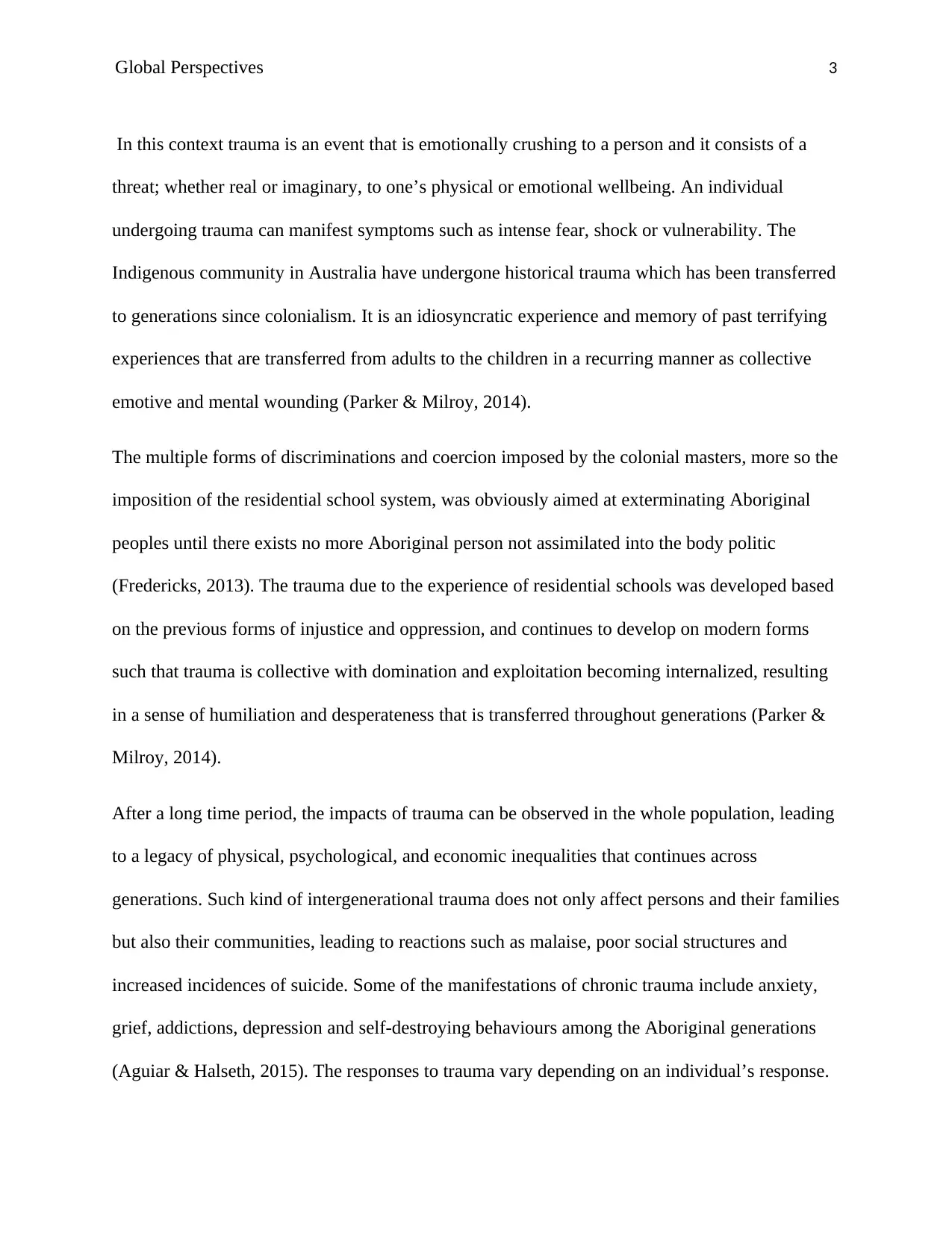
Global Perspectives 3
In this context trauma is an event that is emotionally crushing to a person and it consists of a
threat; whether real or imaginary, to one’s physical or emotional wellbeing. An individual
undergoing trauma can manifest symptoms such as intense fear, shock or vulnerability. The
Indigenous community in Australia have undergone historical trauma which has been transferred
to generations since colonialism. It is an idiosyncratic experience and memory of past terrifying
experiences that are transferred from adults to the children in a recurring manner as collective
emotive and mental wounding (Parker & Milroy, 2014).
The multiple forms of discriminations and coercion imposed by the colonial masters, more so the
imposition of the residential school system, was obviously aimed at exterminating Aboriginal
peoples until there exists no more Aboriginal person not assimilated into the body politic
(Fredericks, 2013). The trauma due to the experience of residential schools was developed based
on the previous forms of injustice and oppression, and continues to develop on modern forms
such that trauma is collective with domination and exploitation becoming internalized, resulting
in a sense of humiliation and desperateness that is transferred throughout generations (Parker &
Milroy, 2014).
After a long time period, the impacts of trauma can be observed in the whole population, leading
to a legacy of physical, psychological, and economic inequalities that continues across
generations. Such kind of intergenerational trauma does not only affect persons and their families
but also their communities, leading to reactions such as malaise, poor social structures and
increased incidences of suicide. Some of the manifestations of chronic trauma include anxiety,
grief, addictions, depression and self-destroying behaviours among the Aboriginal generations
(Aguiar & Halseth, 2015). The responses to trauma vary depending on an individual’s response.
In this context trauma is an event that is emotionally crushing to a person and it consists of a
threat; whether real or imaginary, to one’s physical or emotional wellbeing. An individual
undergoing trauma can manifest symptoms such as intense fear, shock or vulnerability. The
Indigenous community in Australia have undergone historical trauma which has been transferred
to generations since colonialism. It is an idiosyncratic experience and memory of past terrifying
experiences that are transferred from adults to the children in a recurring manner as collective
emotive and mental wounding (Parker & Milroy, 2014).
The multiple forms of discriminations and coercion imposed by the colonial masters, more so the
imposition of the residential school system, was obviously aimed at exterminating Aboriginal
peoples until there exists no more Aboriginal person not assimilated into the body politic
(Fredericks, 2013). The trauma due to the experience of residential schools was developed based
on the previous forms of injustice and oppression, and continues to develop on modern forms
such that trauma is collective with domination and exploitation becoming internalized, resulting
in a sense of humiliation and desperateness that is transferred throughout generations (Parker &
Milroy, 2014).
After a long time period, the impacts of trauma can be observed in the whole population, leading
to a legacy of physical, psychological, and economic inequalities that continues across
generations. Such kind of intergenerational trauma does not only affect persons and their families
but also their communities, leading to reactions such as malaise, poor social structures and
increased incidences of suicide. Some of the manifestations of chronic trauma include anxiety,
grief, addictions, depression and self-destroying behaviours among the Aboriginal generations
(Aguiar & Halseth, 2015). The responses to trauma vary depending on an individual’s response.
⊘ This is a preview!⊘
Do you want full access?
Subscribe today to unlock all pages.

Trusted by 1+ million students worldwide
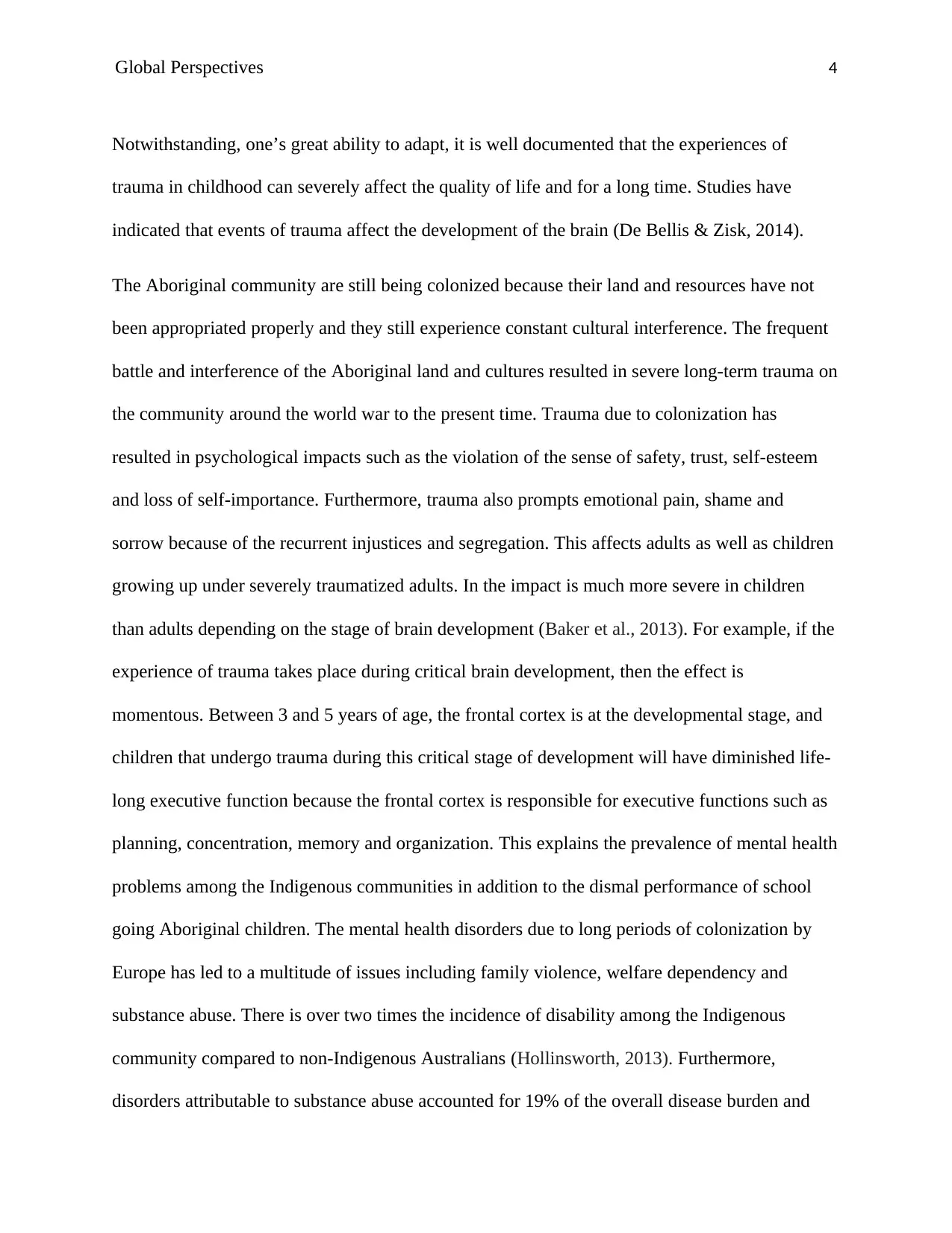
Global Perspectives 4
Notwithstanding, one’s great ability to adapt, it is well documented that the experiences of
trauma in childhood can severely affect the quality of life and for a long time. Studies have
indicated that events of trauma affect the development of the brain (De Bellis & Zisk, 2014).
The Aboriginal community are still being colonized because their land and resources have not
been appropriated properly and they still experience constant cultural interference. The frequent
battle and interference of the Aboriginal land and cultures resulted in severe long-term trauma on
the community around the world war to the present time. Trauma due to colonization has
resulted in psychological impacts such as the violation of the sense of safety, trust, self-esteem
and loss of self-importance. Furthermore, trauma also prompts emotional pain, shame and
sorrow because of the recurrent injustices and segregation. This affects adults as well as children
growing up under severely traumatized adults. In the impact is much more severe in children
than adults depending on the stage of brain development (Baker et al., 2013). For example, if the
experience of trauma takes place during critical brain development, then the effect is
momentous. Between 3 and 5 years of age, the frontal cortex is at the developmental stage, and
children that undergo trauma during this critical stage of development will have diminished life-
long executive function because the frontal cortex is responsible for executive functions such as
planning, concentration, memory and organization. This explains the prevalence of mental health
problems among the Indigenous communities in addition to the dismal performance of school
going Aboriginal children. The mental health disorders due to long periods of colonization by
Europe has led to a multitude of issues including family violence, welfare dependency and
substance abuse. There is over two times the incidence of disability among the Indigenous
community compared to non-Indigenous Australians (Hollinsworth, 2013). Furthermore,
disorders attributable to substance abuse accounted for 19% of the overall disease burden and
Notwithstanding, one’s great ability to adapt, it is well documented that the experiences of
trauma in childhood can severely affect the quality of life and for a long time. Studies have
indicated that events of trauma affect the development of the brain (De Bellis & Zisk, 2014).
The Aboriginal community are still being colonized because their land and resources have not
been appropriated properly and they still experience constant cultural interference. The frequent
battle and interference of the Aboriginal land and cultures resulted in severe long-term trauma on
the community around the world war to the present time. Trauma due to colonization has
resulted in psychological impacts such as the violation of the sense of safety, trust, self-esteem
and loss of self-importance. Furthermore, trauma also prompts emotional pain, shame and
sorrow because of the recurrent injustices and segregation. This affects adults as well as children
growing up under severely traumatized adults. In the impact is much more severe in children
than adults depending on the stage of brain development (Baker et al., 2013). For example, if the
experience of trauma takes place during critical brain development, then the effect is
momentous. Between 3 and 5 years of age, the frontal cortex is at the developmental stage, and
children that undergo trauma during this critical stage of development will have diminished life-
long executive function because the frontal cortex is responsible for executive functions such as
planning, concentration, memory and organization. This explains the prevalence of mental health
problems among the Indigenous communities in addition to the dismal performance of school
going Aboriginal children. The mental health disorders due to long periods of colonization by
Europe has led to a multitude of issues including family violence, welfare dependency and
substance abuse. There is over two times the incidence of disability among the Indigenous
community compared to non-Indigenous Australians (Hollinsworth, 2013). Furthermore,
disorders attributable to substance abuse accounted for 19% of the overall disease burden and
Paraphrase This Document
Need a fresh take? Get an instant paraphrase of this document with our AI Paraphraser
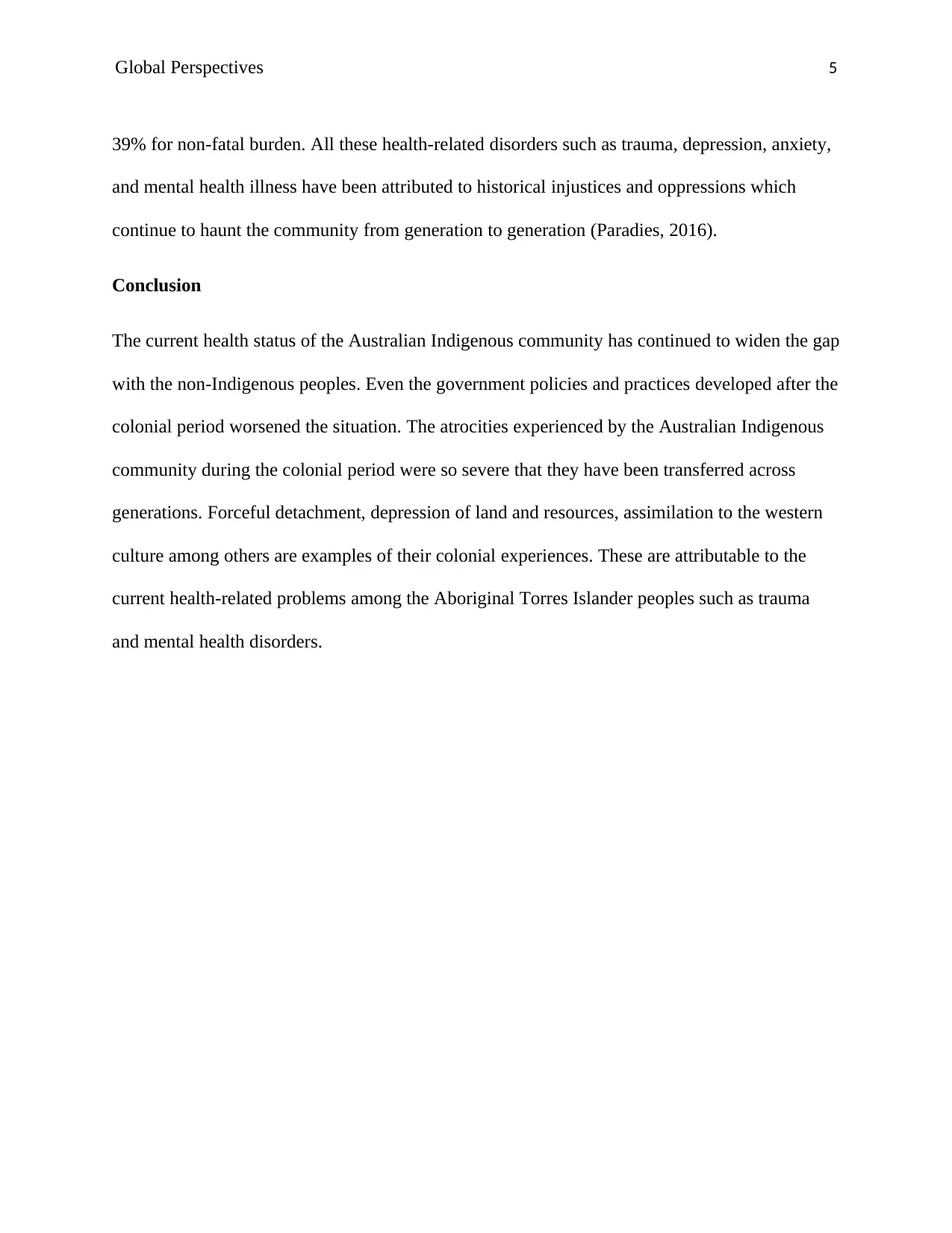
Global Perspectives 5
39% for non-fatal burden. All these health-related disorders such as trauma, depression, anxiety,
and mental health illness have been attributed to historical injustices and oppressions which
continue to haunt the community from generation to generation (Paradies, 2016).
Conclusion
The current health status of the Australian Indigenous community has continued to widen the gap
with the non-Indigenous peoples. Even the government policies and practices developed after the
colonial period worsened the situation. The atrocities experienced by the Australian Indigenous
community during the colonial period were so severe that they have been transferred across
generations. Forceful detachment, depression of land and resources, assimilation to the western
culture among others are examples of their colonial experiences. These are attributable to the
current health-related problems among the Aboriginal Torres Islander peoples such as trauma
and mental health disorders.
39% for non-fatal burden. All these health-related disorders such as trauma, depression, anxiety,
and mental health illness have been attributed to historical injustices and oppressions which
continue to haunt the community from generation to generation (Paradies, 2016).
Conclusion
The current health status of the Australian Indigenous community has continued to widen the gap
with the non-Indigenous peoples. Even the government policies and practices developed after the
colonial period worsened the situation. The atrocities experienced by the Australian Indigenous
community during the colonial period were so severe that they have been transferred across
generations. Forceful detachment, depression of land and resources, assimilation to the western
culture among others are examples of their colonial experiences. These are attributable to the
current health-related problems among the Aboriginal Torres Islander peoples such as trauma
and mental health disorders.
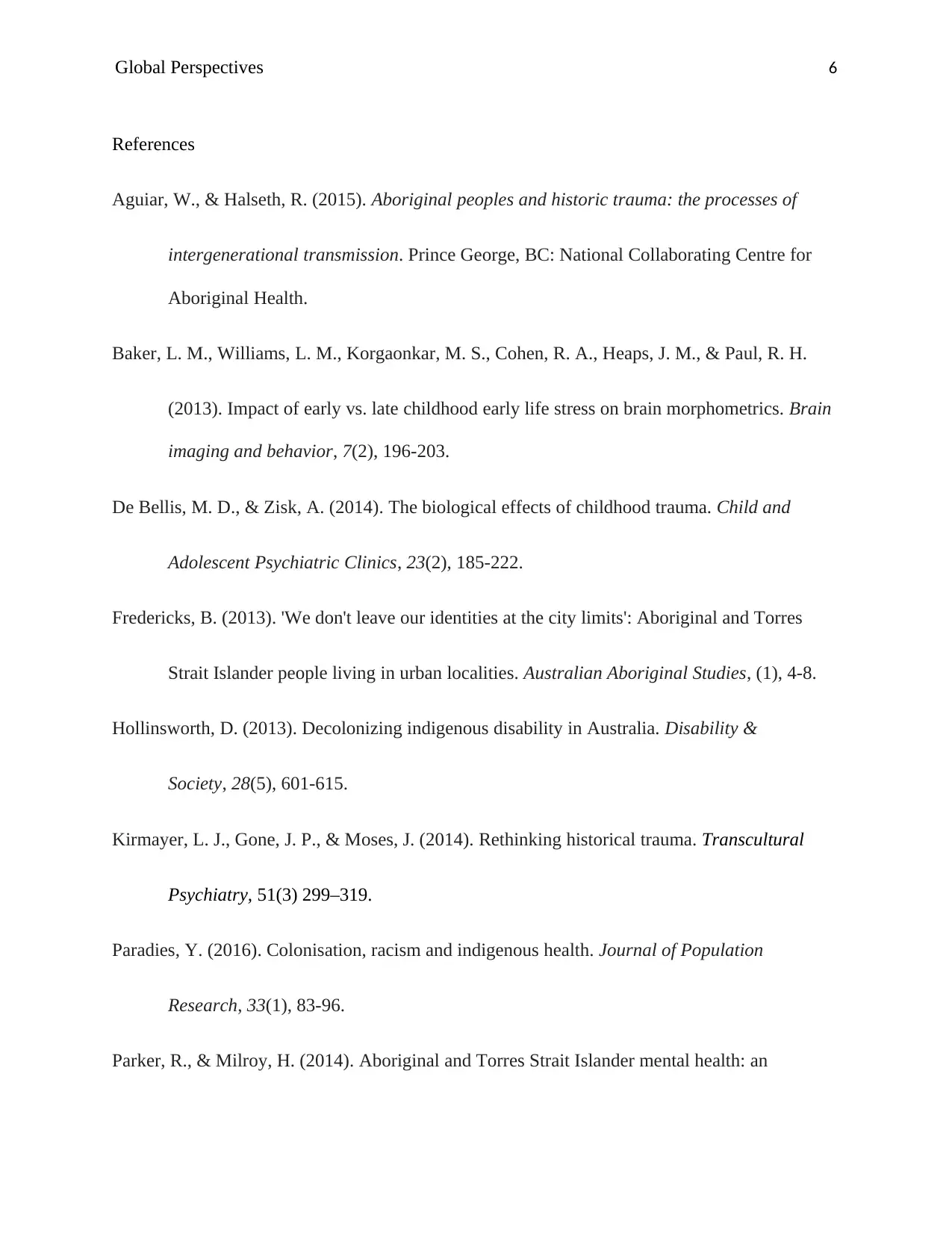
Global Perspectives 6
References
Aguiar, W., & Halseth, R. (2015). Aboriginal peoples and historic trauma: the processes of
intergenerational transmission. Prince George, BC: National Collaborating Centre for
Aboriginal Health.
Baker, L. M., Williams, L. M., Korgaonkar, M. S., Cohen, R. A., Heaps, J. M., & Paul, R. H.
(2013). Impact of early vs. late childhood early life stress on brain morphometrics. Brain
imaging and behavior, 7(2), 196-203.
De Bellis, M. D., & Zisk, A. (2014). The biological effects of childhood trauma. Child and
Adolescent Psychiatric Clinics, 23(2), 185-222.
Fredericks, B. (2013). 'We don't leave our identities at the city limits': Aboriginal and Torres
Strait Islander people living in urban localities. Australian Aboriginal Studies, (1), 4-8.
Hollinsworth, D. (2013). Decolonizing indigenous disability in Australia. Disability &
Society, 28(5), 601-615.
Kirmayer, L. J., Gone, J. P., & Moses, J. (2014). Rethinking historical trauma. Transcultural
Psychiatry, 51(3) 299–319.
Paradies, Y. (2016). Colonisation, racism and indigenous health. Journal of Population
Research, 33(1), 83-96.
Parker, R., & Milroy, H. (2014). Aboriginal and Torres Strait Islander mental health: an
References
Aguiar, W., & Halseth, R. (2015). Aboriginal peoples and historic trauma: the processes of
intergenerational transmission. Prince George, BC: National Collaborating Centre for
Aboriginal Health.
Baker, L. M., Williams, L. M., Korgaonkar, M. S., Cohen, R. A., Heaps, J. M., & Paul, R. H.
(2013). Impact of early vs. late childhood early life stress on brain morphometrics. Brain
imaging and behavior, 7(2), 196-203.
De Bellis, M. D., & Zisk, A. (2014). The biological effects of childhood trauma. Child and
Adolescent Psychiatric Clinics, 23(2), 185-222.
Fredericks, B. (2013). 'We don't leave our identities at the city limits': Aboriginal and Torres
Strait Islander people living in urban localities. Australian Aboriginal Studies, (1), 4-8.
Hollinsworth, D. (2013). Decolonizing indigenous disability in Australia. Disability &
Society, 28(5), 601-615.
Kirmayer, L. J., Gone, J. P., & Moses, J. (2014). Rethinking historical trauma. Transcultural
Psychiatry, 51(3) 299–319.
Paradies, Y. (2016). Colonisation, racism and indigenous health. Journal of Population
Research, 33(1), 83-96.
Parker, R., & Milroy, H. (2014). Aboriginal and Torres Strait Islander mental health: an
⊘ This is a preview!⊘
Do you want full access?
Subscribe today to unlock all pages.

Trusted by 1+ million students worldwide
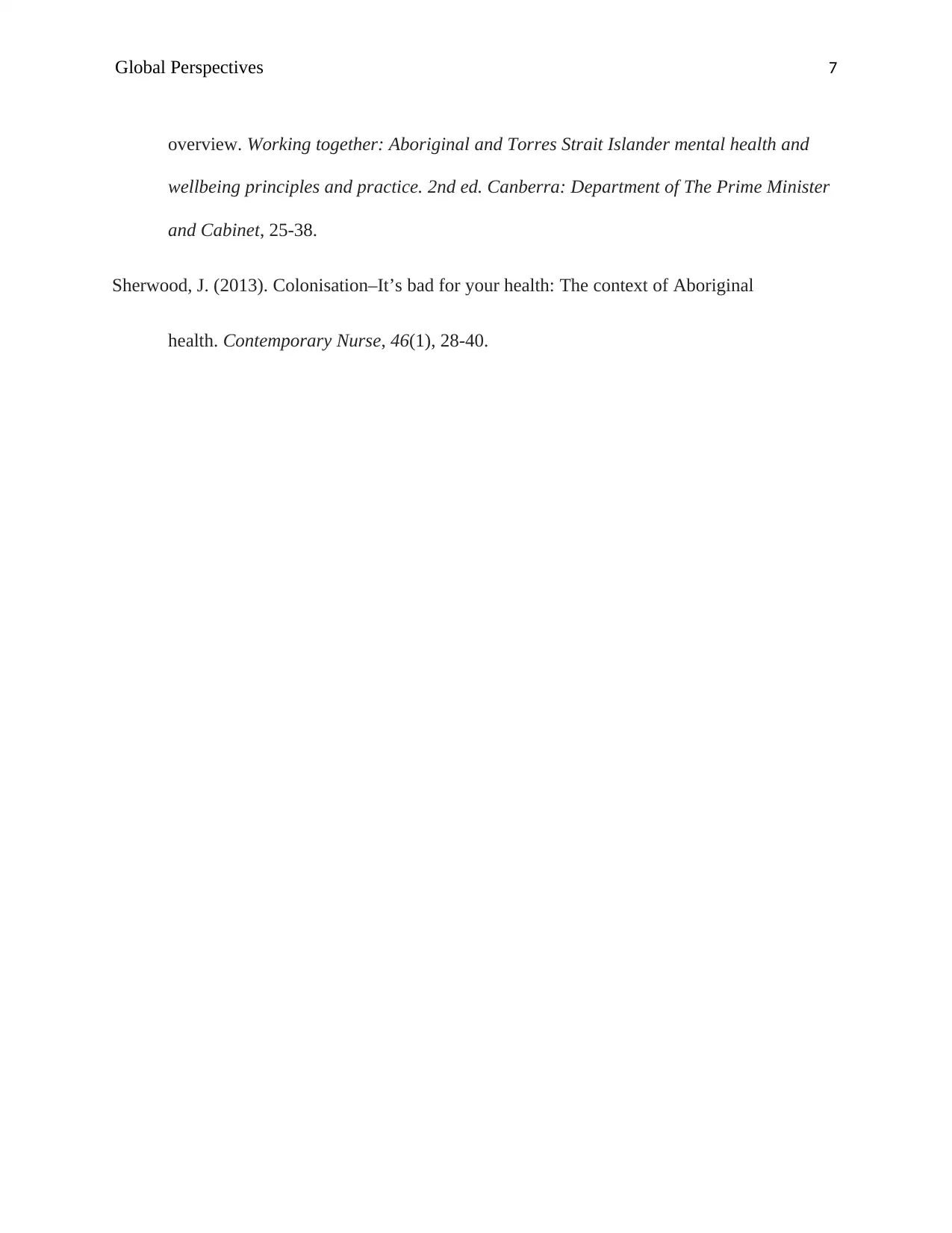
Global Perspectives 7
overview. Working together: Aboriginal and Torres Strait Islander mental health and
wellbeing principles and practice. 2nd ed. Canberra: Department of The Prime Minister
and Cabinet, 25-38.
Sherwood, J. (2013). Colonisation–It’s bad for your health: The context of Aboriginal
health. Contemporary Nurse, 46(1), 28-40.
overview. Working together: Aboriginal and Torres Strait Islander mental health and
wellbeing principles and practice. 2nd ed. Canberra: Department of The Prime Minister
and Cabinet, 25-38.
Sherwood, J. (2013). Colonisation–It’s bad for your health: The context of Aboriginal
health. Contemporary Nurse, 46(1), 28-40.
1 out of 7
Related Documents
Your All-in-One AI-Powered Toolkit for Academic Success.
+13062052269
info@desklib.com
Available 24*7 on WhatsApp / Email
![[object Object]](/_next/static/media/star-bottom.7253800d.svg)
Unlock your academic potential
Copyright © 2020–2026 A2Z Services. All Rights Reserved. Developed and managed by ZUCOL.




